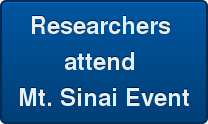 Researchers at the Icahn School of Medicine at Mount Sinai University in New York have been studying how stress on fetal development is affected by different environmental toxins. The National Institute of Environmental Health Sciences (NIEHS) recently awarded Mount Sinai professor and researcher Manish Arora, BDS, PhD, MPH a $1.5 million New Innovator Award to help him continue this research. (Image on left courtesy of Wikimedia)
Researchers at the Icahn School of Medicine at Mount Sinai University in New York have been studying how stress on fetal development is affected by different environmental toxins. The National Institute of Environmental Health Sciences (NIEHS) recently awarded Mount Sinai professor and researcher Manish Arora, BDS, PhD, MPH a $1.5 million New Innovator Award to help him continue this research. (Image on left courtesy of Wikimedia)
Environmental toxins come in all forms and are commonly encountered in the day to day lives of many people. These toxins can be found in the air we breath, food we eat, water we drink, or products we use. Some of the most commonly encountered environmental toxins include:
- Pesticides - found on many foods
- Mold and Fungal Toxins - found in contaminated buildings, certain foods and certain alcoholic drinks
- Phthalates - found in plastics like plastic food containers that can contaminate food
These kinds of toxins are known to have different effects on the human body, and can lead to diseases or cancers with too much exposure. Research is being conducted at the Icahn School of Medicine at Mount Sinai University in New York to see how exposure to environmental toxins affects the body before birth, by studying the effect of toxins on fetal development.
This $1.5 million New Innovator Award will help Dr. Arora and his team continue their research into how different environmental toxins affect the fetus as it develops, as well as to study any long-term health affects caused by these toxins. With further research and more solid confirmation about the effects of toxins, preventative health experts hope that in the near future they can create more regulations to help protect the public from toxins.
Studies conducted in the past have shown that brain development can be impaired due to certain environmental toxins. Now, Dr. Arora and his research team plan to develop a new methodology that can be used to identify the effects on fetal development. This information will help the team reconstruct fetal exposure to environmental toxins to see how much exposure to toxins was had before birth as well as to see when exposure first occurred.
With this new information, the research team can develop new lab techniques and modeling approaches that will share this information with the public to keep them informed about the risks to harmful chemicals.

Mount Sinai University in New York is an active research institution (Photo courtesy of Wikimedia)
The Icahn School of Medicine at Mount Sinai is a more than $600 million life science research marketplace that receives many grants, awards, and donations to help fund many of the institutions ongoing research projects:
- In the 2012 fiscal year, Mount Sinai received $400,680,000 in life science R&D expenditures.
- $10 million has been committed to the Jaffe Food Allergy Institute at The Mount Sinai Medical Center which will create the David H. and Julia Koch Research Program.
- The Brain Injury Research Center at Mount Sinai received grants totaling $6.65 million over a five year period to research traumatic brain injury.
- Mount Sinai researchers received a 5-year $6 million NIH grant to lead a consortium studying autism and intellectual disability.
Are you a lab supply vendor interested in marketing your lab supplies to active researchers at the Icahn School of Medicine at Mount Sinai? Consider participating in the 2015 BioResearch Product Faire™ Event at Mount Sinai where 200 active life science researchers are expected to attend to discover new products and tools to use in their labs. For more information about exhibiting at Mount Sinai in March 2015, please visit the link below:
Are you a researcher interested in finding the latest and most advanced tools and technology for your research goals? If so, click below to pre-register for this event.
Biotechnology Calendar Inc. is a highly respected full service event marketing and planning company that has been producing life science tradeshows at research universities for more than 20 years.




